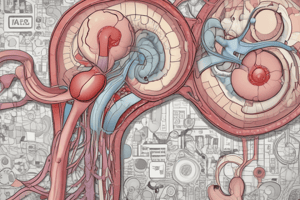Podcast
Questions and Answers
Which of the following is a risk factor for chronic kidney disease (CKD)?
Which of the following is a risk factor for chronic kidney disease (CKD)?
- Low blood pressure
- Regular exercise
- Being under 30 years old
- Family history of diabetes (correct)
What is the definition of CKD?
What is the definition of CKD?
- Presence of kidney damage or decreased kidney function for any duration
- Presence of kidney damage or decreased kidney function for six months or more
- Presence of kidney damage or decreased kidney function for three months or more (correct)
- Presence of kidney damage or decreased kidney function for less than three months
What percentage of the US adult population is estimated to have CKD?
What percentage of the US adult population is estimated to have CKD?
- 7%
- 21%
- 2%
- 14% (correct)
Which of the following is a clinical manifestation of kidney injury?
Which of the following is a clinical manifestation of kidney injury?
What is the process called when the kidney adapts to damage by increasing the filtration rate in the remaining normal nephrons?
What is the process called when the kidney adapts to damage by increasing the filtration rate in the remaining normal nephrons?
What percentage of renal function remains when symptoms of chronic kidney disease become evident?
What percentage of renal function remains when symptoms of chronic kidney disease become evident?
What is the primary reason for the anaemia observed in patients with end-stage renal disease?
What is the primary reason for the anaemia observed in patients with end-stage renal disease?
Which is the most common therapy for renal failure?
Which is the most common therapy for renal failure?
Which symptoms are often present in CKD patients?
Which symptoms are often present in CKD patients?
What is the primary role of dietary measures in the management of CKD?
What is the primary role of dietary measures in the management of CKD?
What is the most common form of Renal Replacement Therapy (RRT)?
What is the most common form of Renal Replacement Therapy (RRT)?
Which test is recommended for measuring physical performance in patients with end-stage renal disease (ESRD)?
Which test is recommended for measuring physical performance in patients with end-stage renal disease (ESRD)?
What effect does exercise training have on kidney function in patients with chronic kidney disease (CKD) who are not yet treated with dialysis?
What effect does exercise training have on kidney function in patients with chronic kidney disease (CKD) who are not yet treated with dialysis?
What is the recommended exercise prescription for CKD patients?
What is the recommended exercise prescription for CKD patients?
What is a potential barrier to exercise for patients being treated with dialysis?
What is a potential barrier to exercise for patients being treated with dialysis?
Which of the following is a special consideration for haemodialysis patients?
Which of the following is a special consideration for haemodialysis patients?
What is the main cause of death in CKD patients?
What is the main cause of death in CKD patients?
What should be considered when making exercise recommendations for CKD patients?
What should be considered when making exercise recommendations for CKD patients?
What is a potential challenge in motivating CKD patients to exercise?
What is a potential challenge in motivating CKD patients to exercise?
Which of the following is a characteristic of hemodialysis?
Which of the following is a characteristic of hemodialysis?
What determines the duration of a dialysis treatment?
What determines the duration of a dialysis treatment?
How is the dialysis fluid introduced in peritoneal dialysis?
How is the dialysis fluid introduced in peritoneal dialysis?
Why do patients choose peritoneal dialysis?
Why do patients choose peritoneal dialysis?
Which treatment option is the preferred choice for End-Stage Renal Disease (ESRD)?
Which treatment option is the preferred choice for End-Stage Renal Disease (ESRD)?
Which complication is NOT associated with peritoneal dialysis?
Which complication is NOT associated with peritoneal dialysis?
What can contribute to the development of obesity and hypertriglyceridemia in patients on peritoneal dialysis?
What can contribute to the development of obesity and hypertriglyceridemia in patients on peritoneal dialysis?
What is a common complication of kidney transplantation?
What is a common complication of kidney transplantation?
Flashcards are hidden until you start studying
Study Notes
Treatment Options for End-Stage Renal Disease (ESRD)
- Peritoneal dialysis allows patients to dialyze on their own schedules and is suitable for patients with cardiac instability.
- Complications of peritoneal dialysis include infection, hernias, low back pain, obesity, gastroesophageal reflux, and delayed gastric emptying.
- Patients on peritoneal dialysis may absorb up to 1,200 kcal per day from the dialysate, contributing to the development of obesity and hypertriglyceridemia.
- Kidney transplantation is the preferred treatment for ESRD.
- Kidneys for transplantation can come from a living relative, an unrelated individual, or a cadaver.
- Patients who undergo transplantation are placed on immunosuppression medication, which includes glucocorticosteroids, cyclosporine, and monoclonal antibody therapy.
- Rejection of the transplanted organ can occur either early (acute) or later (chronic) and is treated with increased dosing of immunosuppression.
- Complications of kidney transplantation include infection, hyperlipidemia, hypertension, obesity, steroid-induced diabetes, and osteonecrosis.
- The incidence of atherosclerotic cardiovascular disease is higher in kidney transplant recipients than in the general population.
- Patients with CKD experience lower peak exercise capacity, earlier muscle fatigue, lower maximal heart rates, and hypertensive pressor response during exercise.
- The functional capacity of CKD patients before dialysis is approximately 50-80% of age-matched healthy controls, which decreases as the disease progresses.
- Reduced exercise capacity in CKD is influenced by factors such as anemia, muscle blood flow, muscle oxidative capacity, myocardial function, and activity levels.
Studying That Suits You
Use AI to generate personalized quizzes and flashcards to suit your learning preferences.



